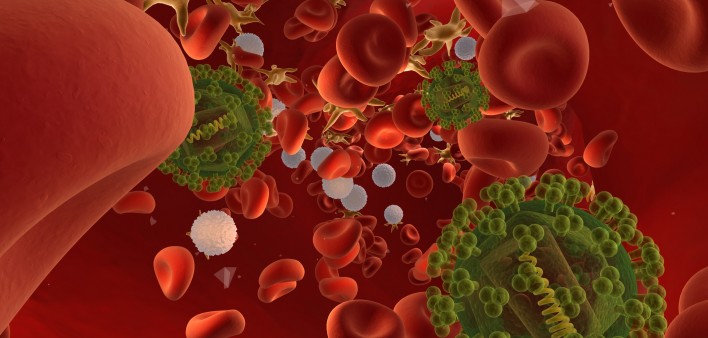A small study conducted in primates and cell cultures has found that genetically engineered blood stem cells succeeded in detecting and destroying HIV-infected cells for more than two years, STAT reports. CAR-T-cell technology, which has made headlines lately thanks to a recently approved cancer treatment based on it, may one day serve as the basis for a cure for HIV—or at least for a way to instigate long-term, if not permanent, immunity.
Publishing their findings in PLOS Pathogens, researchers conducted studies of genetically engineered stem cells that produce the CD4 cells that HIV targets as well as other blood cells, conducting their experiments in both cell cultures and macaque monkeys. The stem cells were tooled to produce HIV-specific molecules known as eponymous chimeric antigen receptors (CARs) that supercharged them to combat the virus more effectively.
One of the CAR molecules on the surface of these genetically modified stem cells hijacked the interaction between HIV and the CD4 molecule, which is found on the surface of CD4 cells themselves and to which the virus binds to infect the cell. As a result, when the CD4 portion of the CAR molecule bound to HIV, other parts of the CAR molecule signaled the larger CD4 cell to kick into gear and kill the other HIV-infected cell.
After the researchers gave the macaques these genetically modified stem cells, they found that the cells safely engrafted in the animals’ bone marrow became functional immune cells that flourished throughout the animals’ bodies. The result was a stable production of CAR-expressing immune cells that persisted for more than two years and was not apparently associated with any adverse effects. Promisingly, these cells cast a wide net through the lymphoid tissues and the gastrointestinal tract, which are major sites for CD4 cells and HIV infection alike as well as hubs that harbor the virus even in the face of ongoing antiretroviral (ARV) treatment.
The study authors believe that such a CAR-T-cell-based treatment in humans would likely be most effective if given in combination with other treatment methods, such as ARV treatment. They believe that such a new approach could ultimately reduce individuals’ dependence on daily ARVs and perhaps lead to the complete eradication of the virus from the body.
To read a press release about the study, click here.
To read the STAT report, click here.
To read the study abstract, click here.







3 Comments
3 Comments